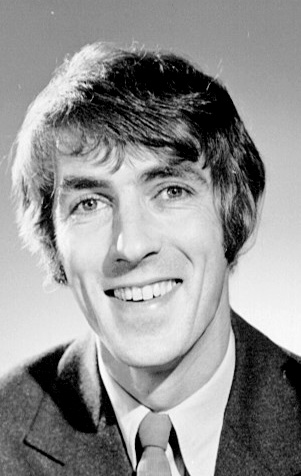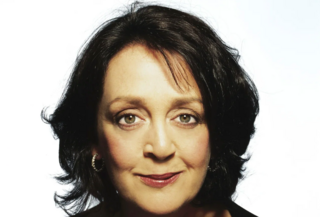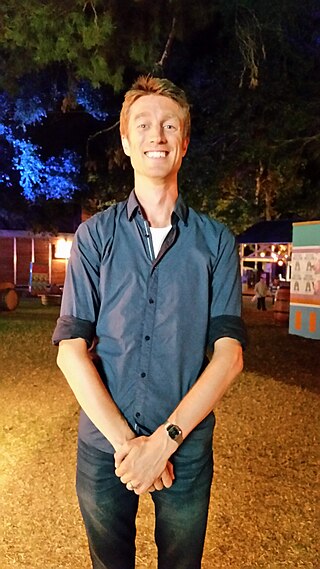Related Research Articles

Peter Edward Cook was an English comedian, actor, satirist, playwright and screenwriter. He was the leading figure of the British satire boom of the 1960s, and he was associated with the anti-establishment comedic movement that emerged in the United Kingdom in the late 1950s.
Fred Dagg is a fictional character from New Zealand created and acted on stage, film and television by satirist John Clarke. Clarke appeared on New Zealand TV screens as Dagg during the mid to late 1970s, "taking the piss" out of the post-pioneering Kiwi "blokes" and "blokesses". The sense of the name "Dagg" is associated with the slang term dag. The Fred Dagg character is a stereotypical farmer and New Zealand bloke: clad in a black singlet and gumboots, hailing from the isolated rural town of Taihape, and attended by numerous associates all named "Trev". One memorable expression was uttered whenever there was a knock at the door: "That'll be the door." When Clarke first unveiled the character of Fred Dagg in recordings and on New Zealand TV in 1975, he became a national star. He also recorded a series of records and cassettes as Dagg, as well as publishing several books.

Fast Forward was Australia's highest-rating and most critically awarded commercial television sketch comedy show, broadcast for 90 one-hour episodes from 12 April 1989 to 26 November 1992.
Rubbery Figures was a satirical rubber puppet series and segment that screened in Australia in various forms from 1984 to 1990. The series ran on the ABC until 1988, when it was axed and subsequently revived as a segment on Seven Network's Fast Forward in April 1989. It featured puppets of major political and social characters.
British humour carries a strong element of satire aimed at the absurdity of everyday life. Common themes include sarcasm, tongue-in-cheek, banter, insults, self-deprecation, taboo subjects, puns, innuendo, wit, and the British class system. These are often accompanied by a deadpan delivery which is present throughout the British sense of humour. It may be used to bury emotions in a way that seems unkind in the eyes of other cultures. Jokes are told about everything and almost no subject is off-limits, though a lack of subtlety when discussing controversial issues is sometimes considered insensitive. Many British comedy series have become successful internationally, serving as a representation of British culture to overseas audiences.

Craig Bruce Reucassel is an Australian radio and television presenter and comedian. He is currently the presenter of Breakfast on ABC Radio Sydney.

John Morrison Clarke was a New Zealand comedian, writer and satirist who lived and worked in Australia from the late 1970s. He was a highly regarded actor and writer whose work appeared on the Australian Broadcasting Corporation (ABC) in both radio and television and also in print. He is principally known for his character Fred Dagg and his long-running collaboration with fellow satirist Bryan Dawe, which lasted from 1989 to his death in 2017, as well as for his success as a comic actor in Australian and New Zealand film and television.
Bryan John Dawe is an Australian writer, comedian, political satirist, songwriter, photographer and social activist. He is known predominantly for his long-running collaboration with fellow satirist, John Clarke, which lasted from 1989 until Clarke's death in 2017; Dawe has also achieved success as a painter and public speaker.
The Big Gig was a popular Australian television sketch comedy music/variety series based on the British TV series Saturday Live. It was produced and broadcast on ABC TV in the late 1980s and early 1990s and was produced and directed by Ted Robinson, who started his career as the director of the second series of the acclaimed The Aunty Jack Show in the early 1970s, and Neil Wilson.
Humour is an integral part of the Canadian identity. There are several traditions in Canadian humour in both English and French. While these traditions are distinct and at times very different, there are common themes that relate to Canadians' shared history and geopolitical situation in North America and the world. Though neither universally kind nor moderate, humorous Canadian literature has often been branded by author Dick Bourgeois-Doyle as "gentle satire," evoking the notion embedded in humorist Stephen Leacock's definition of humour as "the kindly contemplation of the incongruities of life and the artistic expression thereof."
News satire or news comedy is a type of parody presented in a format typical of mainstream journalism, and called a satire because of its content. News satire has been around almost as long as journalism itself, but it is particularly popular on the web, with websites like The Onion and The Babylon Bee, where it is relatively easy to mimic a legitimate news site. News satire relies heavily on irony and deadpan humor.
Patrick St. John Cook is an Australian cartoonist, satirical writer and performer known for his work in The National Times, The Bulletin and on television.
Maxwell Irvine Gillies AM is an Australian actor and a founding member of the 1970s experimental theatre company, the Australian Performing Group.
Phillip Scott is an Australian actor, singer, pianist, writer and comedian.

Wendy Gai Harmer is an Australian author, children's writer, journalist, playwright, dramatist, radio show host, comedian, and television personality.

Samuel Jonathan McMillan is an Australian musical comedian, satirist, writer and radio presenter who performs under the stage name Sammy J. He embraces a variety of media in his comedy, including the use of video and self-composed music, and frequently collaborates with Australian puppet comedian Randy Feltface. He has released several CDs and DVD compilations of his work. He has performed at comedy festivals in Australia, Edinburgh and Montreal, and has appeared on various Australian television shows, including Sammy J & Randy in Ricketts Lane, a sitcom based on the duo's touring show of the same name.

Australian comedy refers to the comedy and humour performed in or about Australia or by the people of Australia. Australian humour can be traced to various origins, and today is manifested in a diversity of cultural practices and pursuits. Writers like Henry Lawson and Banjo Paterson helped to establish a tradition of laconic, ironic and irreverent wit in Australian literature, while Australian politicians and cultural stereotypes have each proved rich sources of comedy for artists from poet C. J. Dennis to satirist Barry Humphries to iconic film maker Paul Hogan, each of whom have given wide circulation to Australian slang.
The Dingo Principle is an Australian satirical comedy series created by Patrick Cook and Phillip Scott which was produced and broadcast by the Australian Broadcasting Corporation (ABC) in 1987.

Clarke and Dawe is an Australian news satire television program that originally aired on the Nine Network from 1989 to 1996 and later on ABC TV from 2000 until 2017. Almost all episodes feature comedians John Clarke and Bryan Dawe engaging in a mock interview, with Dawe playing the interviewer and Clarke playing the interviewee.
References
- ↑ "The Gillies Report - TheTVDB.com". thetvdb.com.
- 1 2 The Gillies Report (1984 - 1985), australianscreen, National Film and Sound Archive.
- ↑ "The Seidler Files: Harry Seidler: Architectural Standover Man". Architectural Blatherations. Retrieved 14 June 2019.
- ↑ Susan Bye, "The Gillies Report and unsustainable political satire", Online Proceedings of ‘Sustaining Culture’ (2008), Annual Conference of the Cultural Studies Association of Australia (CSAA), UniSA, Adelaide 6-8 December 2007, reference note 7
- ↑ See on YouTube
- ↑ "Susan Bye, "The Gillies Report and unsustainable political satire", Online Proceedings of 'Sustaining Culture' (2008), Annual Conference of the Cultural Studies Association of Australia (CSAA), UniSA, Adelaide 6-8 December 2007" (PDF).
- ↑ "Fundraising - Cane Toad Times". The Cane Toad Times . Archived from the original on 16 September 2014. Retrieved 16 September 2014.